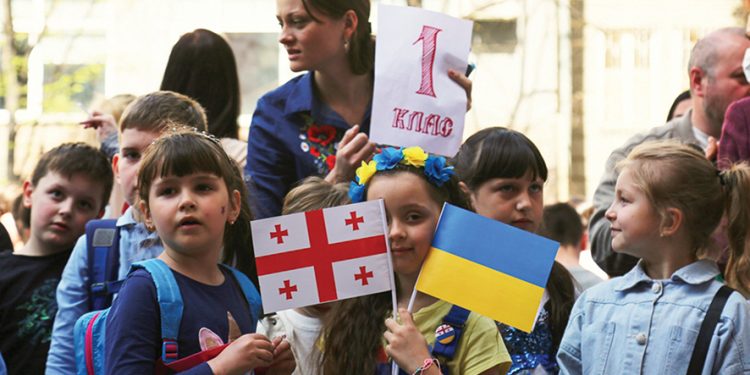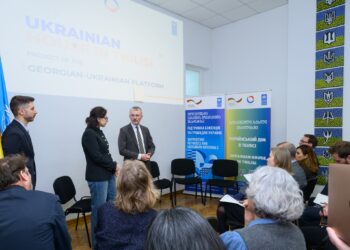As the war in Ukraine reached 1,000 days, the Council of Europe has called for a shift from emergency measures to long-term solutions for the education of Ukrainian children in Europe. On World Children’s Day on November 20, the Council of Europe published a study outlining the key challenges and opportunities for integrating displaced Ukrainian children into education systems across Europe. For Georgia, the study points to both progress and areas in need of improvement.
The study reveals that 50% of children who fled Ukraine are still not enrolled in education in their host countries, with 60% of those enrolled attending online classes broadcast from Ukraine. This creates significant difficulties for both the children and the countries hosting them. Many children also face trauma and psychological challenges due to the ongoing war, which affects their ability to integrate into education systems.
For Georgia, the study highlights a few notable areas of response:
1. Language Support: Like many European countries, Georgia has introduced Ukrainian language courses and recruited Ukrainian-speaking staff to assist displaced students. This has helped children continue their education in their native language while integrating into the local system. However, language support remains a key challenge in many schools.
2. Cultural Identity: The study also notes that Georgia, alongside countries like Estonia and Poland, offers Ukrainian as a second foreign language in schools. This is part of an effort to maintain the cultural identity of Ukrainian children while they adjust to life in their host country. Still, integrating cultural preservation into education practices has been inconsistent. The Ukrainian Ministry of Education invites host states to include New Ukrainian School Hub resources into their programs.
3. School Enrollment Process: In Georgia, the enrollment of Ukrainian children is based on initial assessments of their previous schooling, which allows for tailored placements. However, this process is not always smooth, and further improvements in assessment and school placement flexibility are needed to ensure children are adequately supported.
4. Compulsory Education: The study mentions that compulsory education for Ukrainian children is required in Georgia, aligning with many other Council of Europe member states. However, the implementation of compulsory education varies, and some children are still not attending formal education due to barriers such as language or lack of school capacity.
Key Recommendations:
• Expand Access to In-Person Schooling: Encourage greater enrollment in local schools and provide support to parents and guardians regarding the benefits of in-person education.
• Increase School Capacity and Teachers: Provide additional school places and hire more qualified teachers to meet the demand from displaced children.
• Improve Tracking Systems: Develop more effective systems to identify and enroll children who are currently out of school.
• Individualized Education Plans: Create learning plans based on initial assessments of the children, rather than relying solely on fixed class placements.
• Inclusive School Environments: Promote a more inclusive, “whole-school” approach to support children from diverse backgrounds, including building teachers’ skills to manage multicultural classrooms.
The Council of Europe study stresses that countries like Georgia need to take more proactive steps to build inclusive and resilient education systems for displaced children. While progress has been made, there are still significant gaps in providing consistent, quality education for all Ukrainian children in the country.
The Mapping Study, based on research conducted in May-June 2024, examines the educational practices of 32 Council of Europe member states and 13 other countries with high numbers of Ukrainian refugees. It serves as a comprehensive analysis of the current state of educational access for Ukrainian children across Europe, providing a roadmap for improving educational integration and support for displaced children.
Georgia, like other countries, faces significant challenges in meeting the educational needs of Ukrainian children. Moving forward, it will be essential for the country to implement more sustainable, long-term educational solutions to ensure that all children, regardless of their background or displacement, receive the support they need to succeed.
By Team GT














